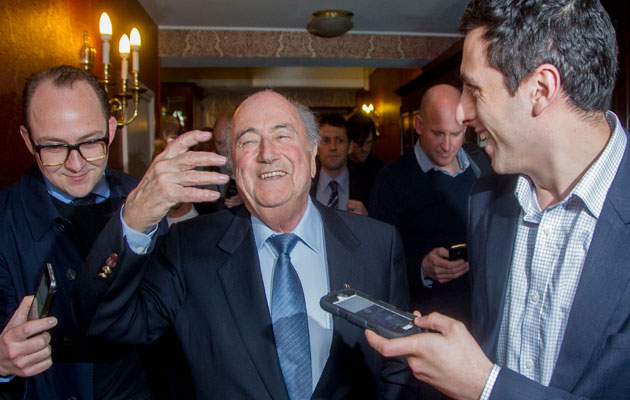BBC and Sky want to host a televised debate between the four candidates for the FIFA presidency. They can forget it. Sepp Blatter will not be playing ball.
The president of the world football federation, currently attending the South American confederation congress, is runaway favourite to be re-elected for a fifth term in office at FIFA Congress on May 29 in Zurich.
Hence, as a source close to Blatter has insisted to this writer, the 78-year-old is not tempted to waste minutes or even seconds considering the idea.
Blatter has three challengers: FIFA’s Asian vice-president Prince Ali bin Al-Hussein of Jordan, Dutch federation chairman Michael Van Praag and Portugal’s former World Player of the Year, Luis Figo.
Last year the proposal for a TV debate, to open up the candidates and issues to fans around the world, was raised by Jerome Champagne. The former FIFA official has since fallen by the wayside but the call for a TV debate was taken up by Prince Ali and has been endorsed by Figo.
BBC and Sky have formally invited all four candidates to a broadcast debate and Football Association chairman Greg Dyke – a former TV executive – has offered to host it at Wembley.
A statement from Sky said: “Sky, in collaboration with the BBC, has invited all four candidates in the FIFA presidential election to take part in a live debate.
“We believe this will present an unprecedented opportunity for the candidates to set out their plans and communicate directly with fans from around the world. We hope for a positive response from all four candidates.”
Dyke, a face-to-face critic of Blatter on the eve of the World Cup finals in Brazil last year, said: “I would love to see a leaders’ debate. I would love to see the four candidates for this election get in a room together and be questioned. We would happily host it at Wembley.”
Figo, who launched his candidacy on the same ‘office suite turf’ at Wembley last month, thought the candidates all “owe it to the fans to have an open, honest discussion about the future of FIFA as the international governing body.”
In generating still more media chatter, he added: “I fully support the idea of a public debate. All four candidates need to participate . . . and the football community, including the public and the fans, deserves to know what all four candidates offer for the future.”
In fact Figo’s “public and fans” do not possess a vote. Comparisons raised with a proposed TV leaders’ debate ahead of the forthcoming British General Election is minimal. At FIFA only the member associations possess a vote.
Blatter is comfortable, firstly, that he has a clear majority among those 209 FAs who know well that his signature has certified their development grants down the years and is thus their friendly favoured candidate. Hence, without lifting a finger, he already possesses a supportive foundation.
From a TV debate, he has nothing to gain.
Secondly, the power of incumbency is vast. Any president standing for re-election carries the aura of the post with him and a perception that he knows the job better than any of his rivals (which is logical and inevitable).
Once more, nothing to gain.
Thirdly, Blatter knows that were he to share a stage with his three rivals he would both be stepping down to their ‘ordinary’ level and lifting them up to his status.
Nothing to gain.
Fourthly, on the same stage, Blatter would come under critical, negative, embarrassing fire for the length of the debate from the other three candidates and, inevitably, from the programme host.
Everything to lose.
Hence The Great FIFA Presidential TV Debate . . NOT coming to a screen near you any time at all.







